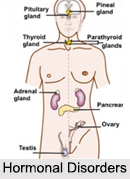 Hormonal disorders are conditions that affect the endocrine system and the hormones they release. As such the effect of hormonal disorders can range throughout the whole body as different disorders can manifest in different areas. Hormones are produced primarily in the endocrine glands but certain parts of the body such as the kidney or the placenta can also release hormones in conjunction with the endocrine system.
Hormonal disorders are conditions that affect the endocrine system and the hormones they release. As such the effect of hormonal disorders can range throughout the whole body as different disorders can manifest in different areas. Hormones are produced primarily in the endocrine glands but certain parts of the body such as the kidney or the placenta can also release hormones in conjunction with the endocrine system.Hormones play a large and important role in a person’s daily health and well-being. Diseases, certain stages of life and different health conditions can affect the body’s ability to make or use the hormones one need.
Causes of Hormonal Disorders
There are many different causes of hormonal disorders. Some may be genetically linked, as some may seem to run within the family, such as diabetes. Others may involve nutritional factors. Age also plays a factor in the development of hormonal disorders, especially in the production of sex hormones which reduces in both sexes as they age. Sometimes auto-immune disorders can affect the hormone production by attacking hormone production sites in the body, disrupting the normal processes of the organ.
Symptoms of Hormonal Disorders
Typically hormonal disorders involve either an overproduction by hyperactive glands or deficiency of a certain hormone by hypoactive glands. Depending on the hormonal disorder, the symptoms may vary greatly. Some may not even manifest symptoms immediately until the problem is severe.
Types of Hormonal Disorders
Hormone disorders include endocrine system diseases, which directly affect the glands of the endocrine system. Conditions relating to hormones can be wide-ranging.
To learn more visit the link below: